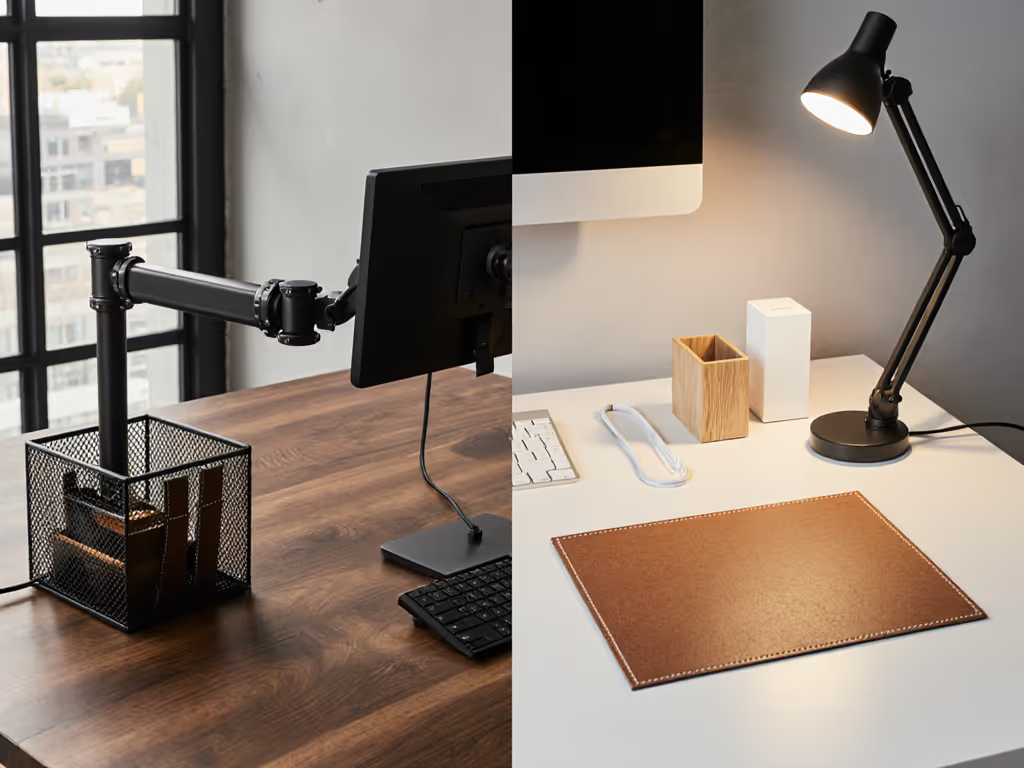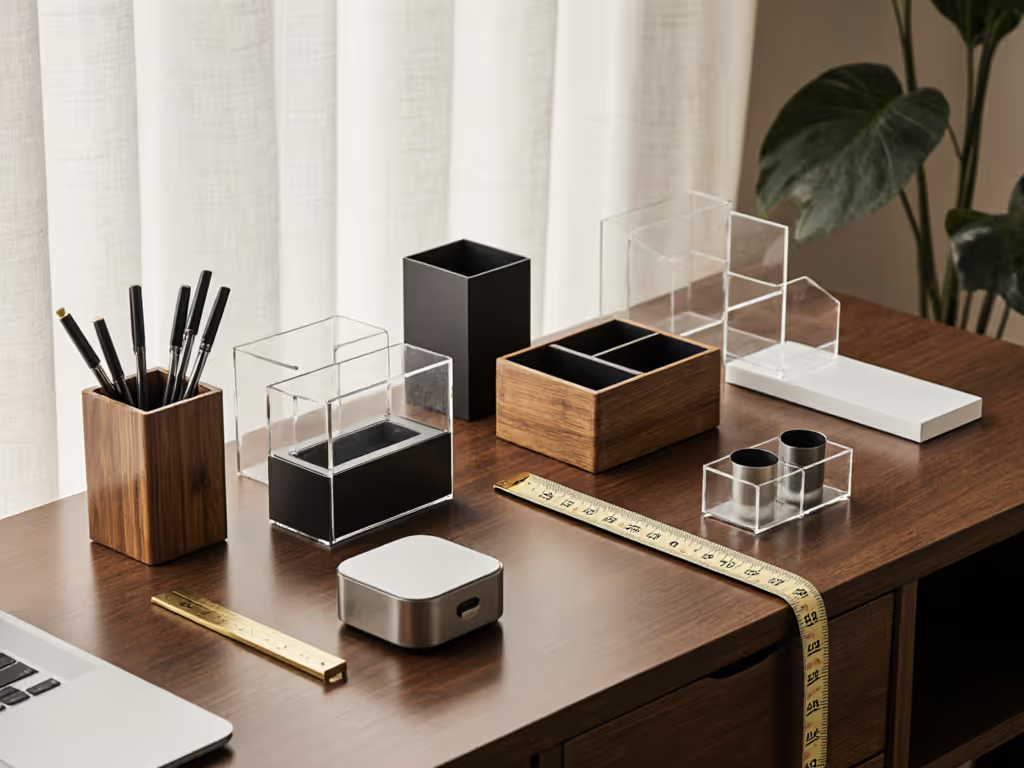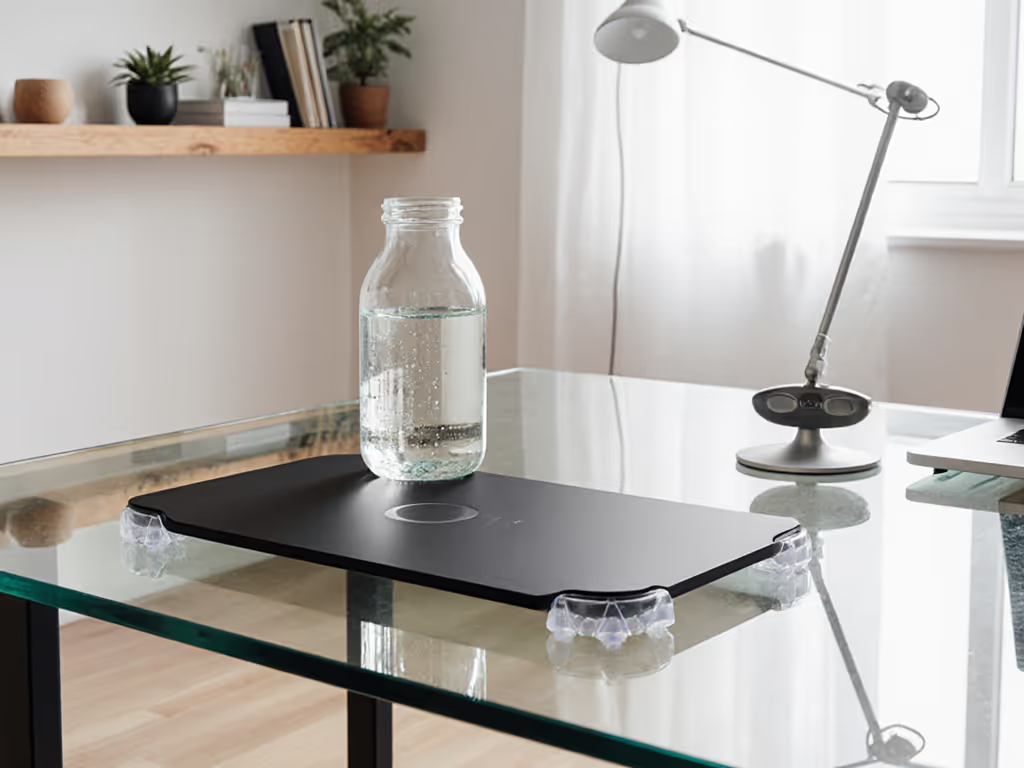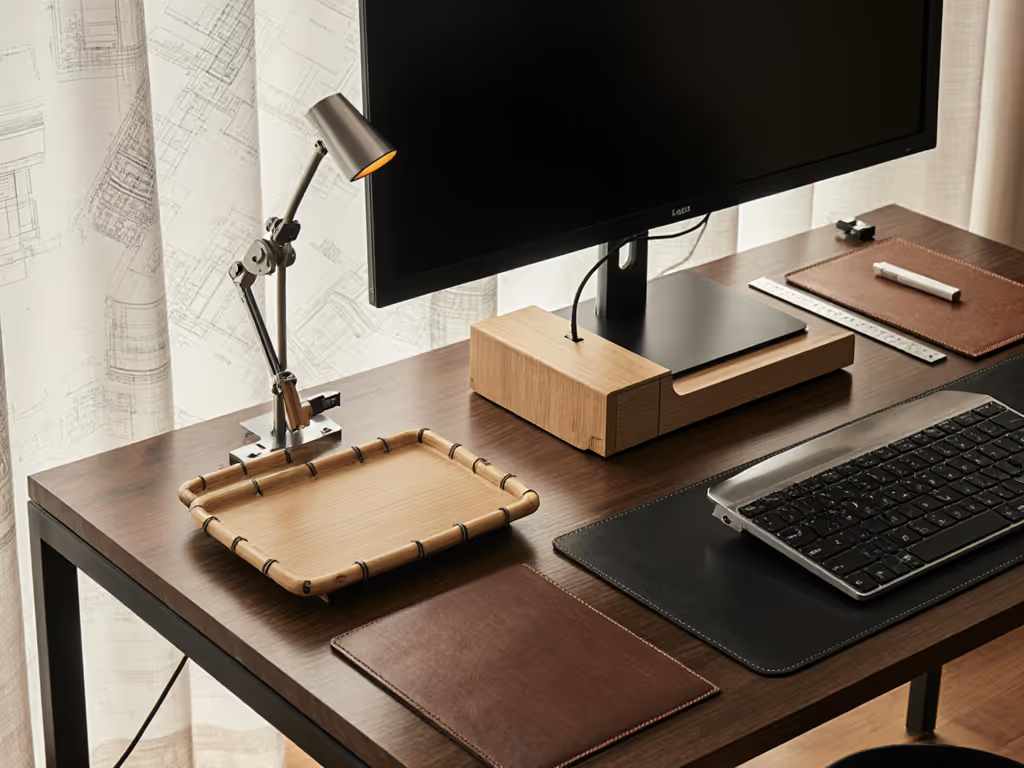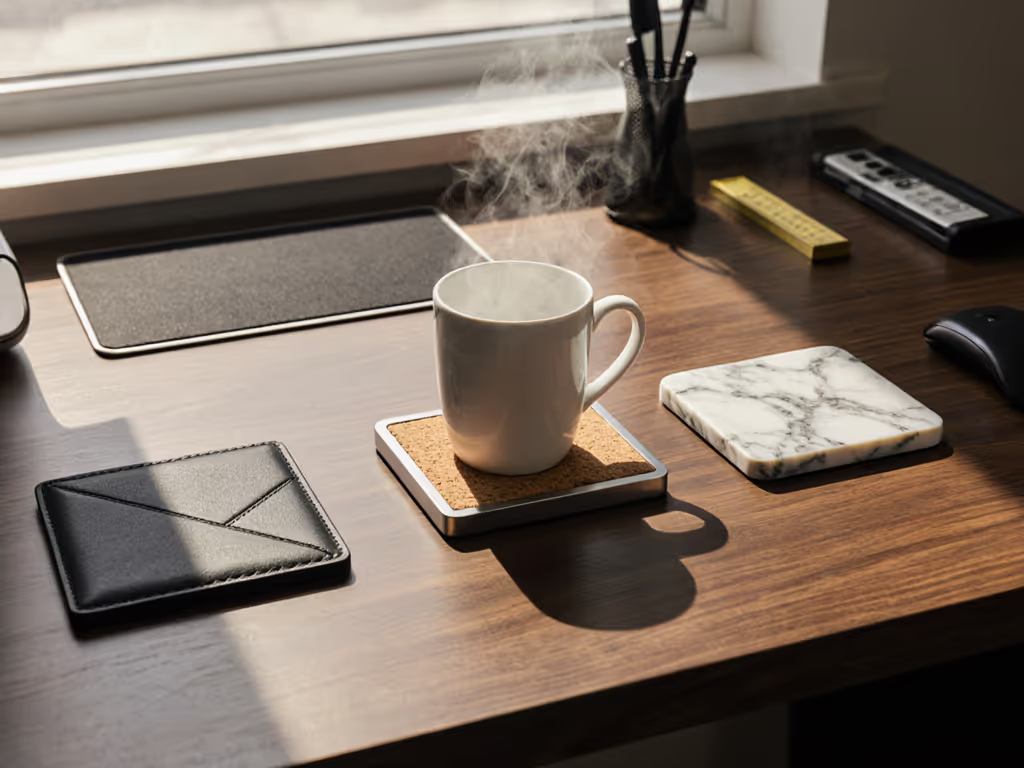
Best Pen Holders Compared: Match Your Desk Style & Budget
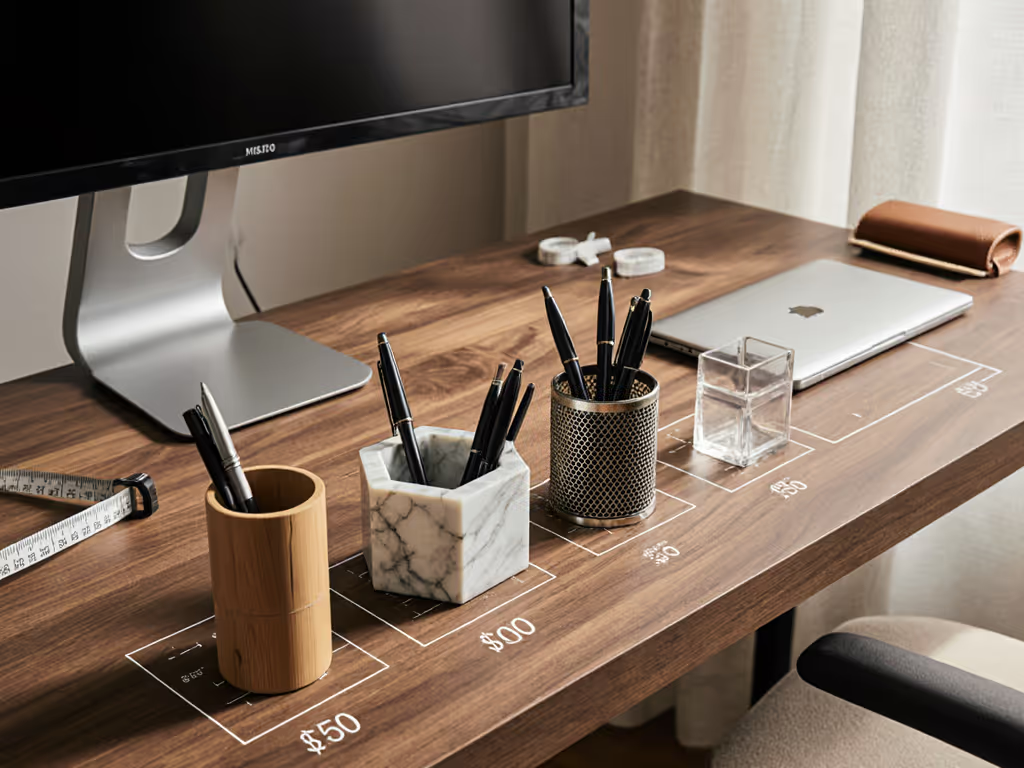
When hunting for a pen holder that won't clutter your workspace, most people skip the critical first step: measuring your desk's actual real estate. Without plain-language measurements, even cheap desk organizers become expensive mistakes when they collide with drawers, monitors, or wall hooks. After helping thousands avoid return fatigue, I've learned that pen storage solutions thrive only when they fit your desk's constraints (not your Pinterest board). Let's fix that.
Map your desk before your cart.
Why Your Desk Measurements Dictate Pen Holder Success
That dreamy rotating bamboo pen holder? Worthless if it blocks your monitor arm's pivot range. The sleek acrylic cup? A hazard if it teeters near your standing desk's motor. Your desk's depth, surface thickness, and accessory interference zones (like crossbars or wall clearance) create non-negotiable safe zones for any desk pen holder. Ignore them, and you'll face workflow collisions, like pens knocking over when adjusting your chair.
Remember my rental move? I'd bought a clamp-style mic arm needing 2" of desk overhang... only to find my IKEA desk had zero overhang. Instead of returning it, I drafted a fit map marking clamp zones, wall-safe radii, and no-drill territories. That one page became my blueprint for every accessory, including pen storage. Start with a fit map; buying gets calmer and cleaner.
Your Desk Measurement Starter Map
Grab a tape measure and note these before browsing:
- Available Footprint: Width/depth where pens live (e.g., 4"×4" left of keyboard)
- Interference Zones: Distance from monitor base, wall, or drawer fronts
- Surface Thickness: Critical for clamp-mounted holders (most need 0.5"-2.5")
- Workflow Radius: How far you reach without straining (measure elbow-to-desk)
Now, let's match measured constraints to proven desk pen holder solutions.
Top 7 Pen Holders: Filtered by Desk Reality
1. Renters' Best Bet: Utoplike Bamboo Rotating Organizer
Fit Map Requirements:
- Footprint: 7.9"×7.9" (ideal for desks 22"+ deep)
- Clearance: Needs 6" wall clearance (no clamp needed)
- Safe Zone: Avoid edges <2" from monitor bases
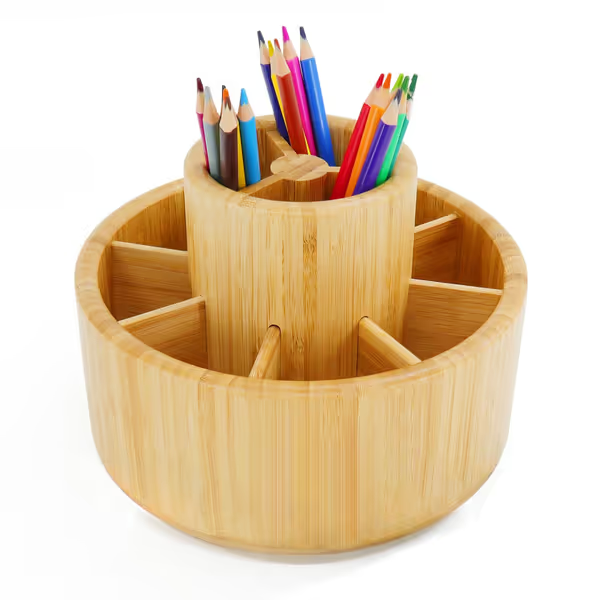
Utoplike Bamboo Rotating Desk Organizer
This 360° spinner solves the "hunt for the red pen" chaos with 11 multi-depth compartments, but only if your desk depth accommodates its 7.9" width. The bamboo base stays put on smooth surfaces (no adhesives!), making it a renter-safe no-drill option. At 5.7" high, it clears most laptop stands, but check your monitor's lower bezel height. Upgrade note: Its height blocks monitor arms with low-profile bases. Measure your screen's bottom clearance first.
2. Tight-Space Savior: Poppin Dual-Compartment Pen Holder
Fit Map Requirements:
- Footprint: 3.25"×3.25" (fits desks as shallow as 16")
- Interference: Zero wall/drawer conflicts (self-contained)
- Workflow Radius: Best within 12" of dominant hand
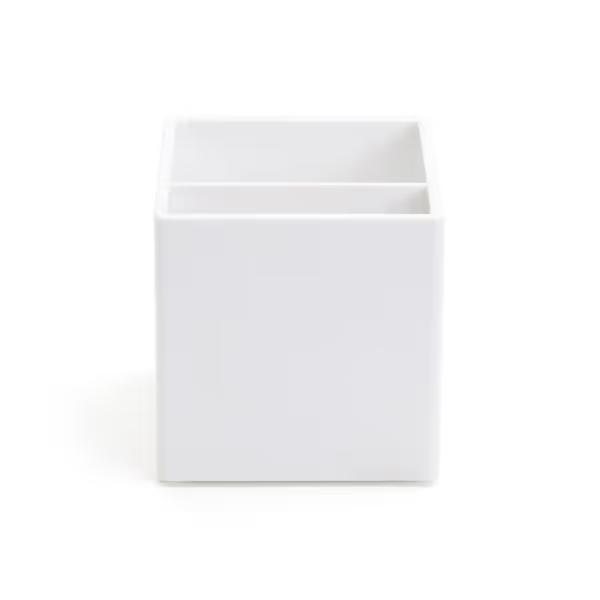
Poppin Pen Holder - 2 Compartments
When desk depth is under 18", this squat acrylic cube is a game-changer. Its dual compartments sort by ink type (e.g., black pens vs. highlighters), and the 0.32oz weight won't tip even on wobbly desks. The lacquer finish hides smudges, a godsend for coffee-heavy workflows. Critical constraint: Its 3.25" height fits under monitor arms with 4"+ clearance, but check your arm's pivot radius. If your arm swings within 3" of the desk edge, this pen holder belongs centered in your keyboard tray's dead zone.
3. Crossbar-Clash Avoider: Mesh Desk Organizer Tray
Fit Map Requirements:
- Surface Thickness: Must be 0.75"-2" for clamp stability
- Clamp Zone: Requires 3" of unobstructed desk edge
- Height Clearance: Max 5.5" below monitor base
Not all holders need clamps, but if your desk has crossbars (like IKEA BEKANT), this metal tray mounts beside them, avoiding the "clamp vs. crossbar" war. The mesh design shows contents instantly, and its 5.5" height won't shadow your screen. Warning: Measure desk thickness at the clamp point. Most fail here: 0.5" particleboard desks can't handle clamp torque. If your desk is <0.75" thick, skip this for adhesive-free magnetic holders (see #5).
4. Budget Powerhouse: Amazon Basics Mesh Pen Holder
Fit Map Requirements:
- Footprint: 8.7"×5.5" (needs 20"+ desk depth)
- Drawer Conflict: Keep 4" from sliding keyboard trays
- Aesthetic Zone: Best with industrial/modern desks
This $12 steel organizer offers surprising heft with visible storage, ideal if your desk depth exceeds 20". But its fixed 5.5" height demands clearance under monitor arms. Key metric: Measure from desk surface to arm's lowest pivot point. If <5.5", it'll block tray movement. Also, its 8.7" width overhangs shallow desks, creating cable-snag zones near walls. For measurement-first solutions that keep cords out of the way, see our best cable management systems comparison. Calculate your "overhang tolerance": total desk depth minus monitor footprint minus 4" (for chair clearance). If <8.7", look at compact options like #2.
5. Adhesive-Free Alternative: Magnetic Refrigerator Holder
Fit Map Requirements:
- Surface Type: Must have steel backing (e.g., filing cabinet)
- Reach Radius: Place within 18" of primary work zone
- Wall Clearance: Needs 2" space behind vertical surface
Skip the sticky residue! These holders stick to vertical steel surfaces, freeing up precious desk real estate. But measure your vertical anchor first: will a filing cabinet fit beside your desk without blocking chair movement? Check the holder's pull strength (rated in lbs). For pens, 2-3 lbs is ample. Pro tip: Use it on the side of a metal monitor stand, which creates a "vertical safe zone" immune to desk vibrations.
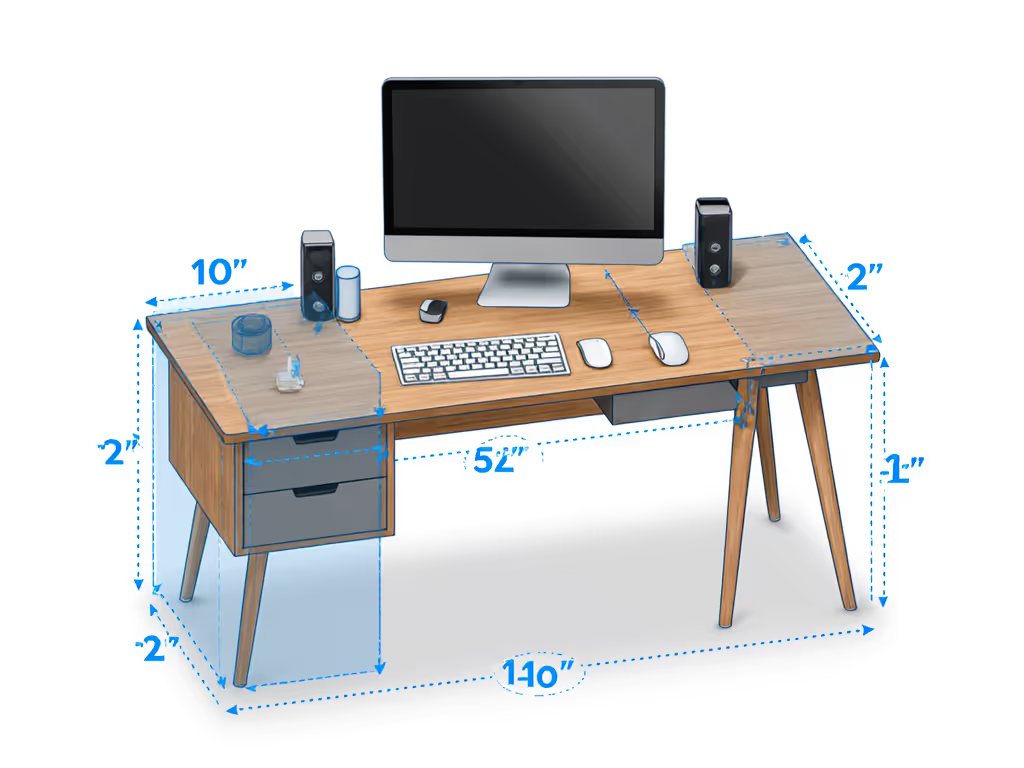
6. Ultrawide Desk Specialist: Gustav Loop Open-Top Caddy
Fit Map Requirements:
- Footprint: 9"×5" (for desks 24"+ deep)
- Monitor Conflict: Minimum 6" from ultrawide bezels
- Cable Routing: Needs 2" gap behind for cord management
Owners of 34"+ ultrawides know: standard pen cups vanish behind curved screens. The Gustav Loop's open front solves this, but its depth demands space in front of your monitor. Measure your "active zone": the area within arm's reach but not shadowed by the screen. If it's <9", this won't work. Hidden constraint: Its aluminum base won't slide on glass desks. Add non-slip pads (0.1" thick) to your height calculations.
7. Micro-Desk Hero: Compact Leather Organizer
Fit Map Requirements:
- Footprint: 4.3"×4.3" (fits desks as shallow as 14")
- Shared Surface: Must clear laptop stands by 2"
- Reach Test: Max 8" from home row keys
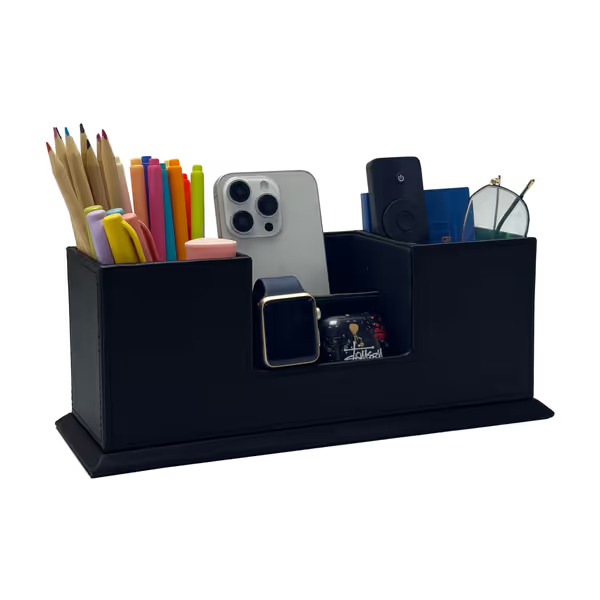
UnionBasic Desk Organizer
For dorm desks or corner workstations, this faux-leather cube maximizes tiny zones. But its 4.3" depth becomes a hazard if placed near standing desk columns. Check your lift's swing arc! Critical step: Map your "panic zone" (where hands flail during video calls). If it overlaps with your pen holder location, shift it left by your palm width (avg. 3.5").
Your Upgrade Path: From Temporary to Timeless
Phase 1: The Renter's Starter Kit ($15-$25)
- Poppin Pen Holder (for <18" desks) or Magnetic Holder (for steel surfaces)
- Why: Zero-damage, fits measured footprint constraints
Phase 2: Hybrid Work Refinement ($25-$40)
- Utoplike Bamboo Organizer or Gustav Loop (if desk depth >20")
- Why: Adds compartments for shared-office supplies
Phase 3: Premium Ergonomic Integration ($40+)
- Mesh organizers with cable routing slots
- Why: Scales with monitor arms and laptop docks
Map your desk before your cart (every single time).
The Final Measurement Check
Before clicking "buy," cross-check your Fit Map:
- ✅ Is the footprint smaller than your measured safe zone?
- ✅ Does height clear monitor arms at all pivot angles?
- ✅ Will it stay put during standing desk transitions?
That bamboo spinner I almost returned? It now lives in my desk's "goldilocks zone": 7" from the wall, 4" from my monitor, where it won't topple during Zoom calls. No magic, just measured constraints. Your perfect desk pen holder isn't about aesthetics first, it's about space intelligence. Measure once, buy once, keep forever.
Related Articles

